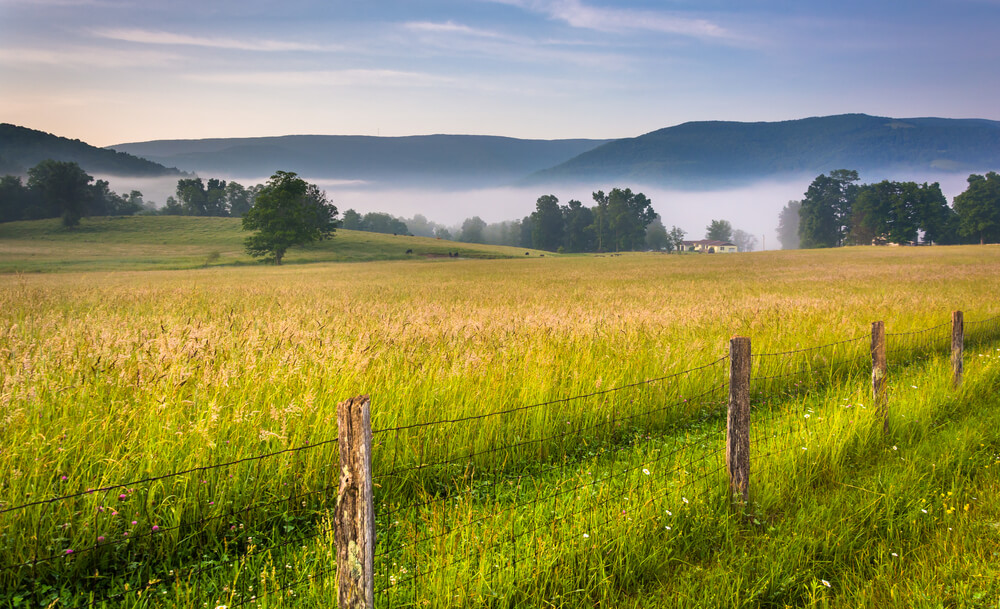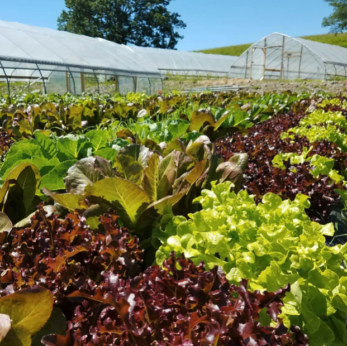Can Farming Save Appalachia?
Two West Virginia nonprofits are cultivating coal mines in the hopes that lettuce and broccoli can sprout change in communities.
Can Farming Save Appalachia?
Two West Virginia nonprofits are cultivating coal mines in the hopes that lettuce and broccoli can sprout change in communities.

Farm fields and foggy mornings in West Virginia.Jon Bilous
A reclaimed coal mine might not be the ideal place to grow vegetables, but the terrain didn’t stop Fritz Boettner from digging in. The director of Sprouting Farms has been working to revitalize the local food system in coal mining communities across West Virginia since 2014. The nonprofit established a farm incubator to train new farmers, developed partnerships with farms to expand wholesale markets in the area and created a local food hub with the goal of providing opportunities in the small, rural communities that once depended on coal mining to put food on their tables.
“One of the things we keep hearing is how happy people are to see things being built — to see investments in our communities — because usually things just come down in West Virginia,” explains Boettner. “With farming, we’re trying to create an alternative and give people hope.”
In a 2019 report, the Appalachian Regional Commission (ARC) identified local food systems and agriculture as two promising sectors to build economic resilience in the region, which is important in a state with the lowest labor force participation rate in the nation, where the decline of coal mining has left residents with few options to make a living.
Wendy Wasserman, communications director for the ARC, supports efforts to transform reclaimed coal mines into productive agricultural land. “We’re seeing a growing pride in local agriculture and its potential to be a valuable economic driver in our communities,” she says.

Converting Challenges Into Opportunities
With the help of a $1.5 million grant from the ARC POWER Initiative, Boettner began building a regional food system in West Virginia. He purchased an 85-acre training farm and partnered with another nonprofit, Refresh Appalachia, to launch Turnrow: Appalachian Farm Collective, a food hub that processes, markets, sells and distributes fresh foods grown on farms across Appalachia, including training farms operated by Sprouting Farms and Refresh Appalachia.
Boettner admits that the concept was strong, but the execution proved to be challenging. For starters, the land in West Virginia is more conducive to coal mining than agriculture. Refresh Appalachia tried growing vegetables on a reclaimed mining site in Mingo County, but the terrain and soil conditions proved too challenging and, when grant funding expired, director Adam Hudson decided not to pursue farming on alternative sites.
Refresh Appalachia and Sprouting Farms teamed up to turn another reclaimed mining site into an aquaponics facility that will grow tilapia and lettuce, thanks to a separate grant from the Abandoned Mine Land Reclamation Economic Development Pilot Program. The facility is scheduled to go online in early 2020.
In addition to providing jobs, the food hub and aquaponics facility create opportunities for both new and experienced farmers. Turnrow brings together a regional network of farms to sell large quantities of fresh produce throughout Appalachia. Its distribution area spans from Blacksburg, Virginia, to Huntington, West Virginia, and continues to grow, and the expanded distribution area means more sales.
“We’ve been having meetings with farmers, coming up with production plans and creating agreements so that we can continue to meet demand and build up their businesses,” says Boettner. “To me, farmers in West Virginia have always been subsistence farmers, and we’re showing them how to grow to scale, reach new markets and find new opportunities to sell their produce.”
Local farmers are responding. The food hub has increased from 10 producers and $65,000 in gross revenue in 2017 to 50 producers and $225,000 in gross revenues last season, and demand continues to grow. Boettner hopes revenues will hit $500,000 this year.
To keep up with the demand from restaurants, schools and farmers’ markets, Boettner is recruiting additional farm partners to grow more produce, and Hudson is recruiting additional participants to the Refresh Appalachia workforce development training program.
“Right now, we have more market demand than production, which is great for farmers and the local economy,” says Hudson. “When local farmers produce food that is purchased with local dollars, that money goes back into local communities, and we need that for viable economic development.”
The Struggle to Support Local Food
While the ARC, Sprouting Farms, Refresh Appalachia and other local organizations are fighting to make agriculture a viable industry in West Virginia, making local food accessible to residents remains challenging. “Most people here can’t afford to buy local food,” says Hudson. “Through no fault of their own, the cost is out of reach.”
Efforts are being made to expand the SNAP Stretch program, an initiative that allows low-income residents to double or triple the value of SNAP dollars at farmers’ markets throughout West Virginia. Sprouting Farms is working to expand the program to the Charleston’s Capitol Market, the largest farmers’ market in the state, to improve access to fresh local foods.
“It’s not just about doing the SNAP Stretch program for the vendors that are part of the food hub,” says Boettner. “We want to connect low-income residents with all of the market vendors to make local food more affordable.”
With multiple organizations committed to addressing the issue, Hudson believes it’s possible to build a local food system that prioritizes healthy, affordable food for residents and sustainable market opportunities and fair wages for farmers. But even a thriving local food system might not be enough to replace the economic devastation created by declines in coal mining.
“The coal industry is this huge economic and cultural identity that we’ve had for more than 100 years, but West Virginia is more than just coal,” says Boettner. “Farming might not replace the incomes or jobs provided by coal fields, but I think it can provide pride in our communities and ownership over our destinies. We want to feed healthy foods to our communities, and our goal is to take these opportunities and try really hard to see if we can make them sustainable because investing in our farms is good for our communities.”
Follow us
This work is licensed under a Creative Commons Attribution-NoDerivatives 4.0 International License.
Want to republish a Modern Farmer story?
We are happy for Modern Farmer stories to be shared, and encourage you to republish our articles for your audience. When doing so, we ask that you follow these guidelines:
Please credit us and our writers
For the author byline, please use “Author Name, Modern Farmer.” At the top of our stories, if on the web, please include this text and link: “This story was originally published by Modern Farmer.”
Please make sure to include a link back to either our home page or the article URL.
At the bottom of the story, please include the following text:
“Modern Farmer is a nonprofit initiative dedicated to raising awareness and catalyzing action at the intersection of food, agriculture, and society. Read more at <link>Modern Farmer</link>.”
Use our widget
We’d like to be able to track our stories, so we ask that if you republish our content, you do so using our widget (located on the left hand side of the article). The HTML code has a built-in tracker that tells us the data and domain where the story was published, as well as view counts.
Check the image requirements
It’s your responsibility to confirm you're licensed to republish images in our articles. Some images, such as those from commercial providers, don't allow their images to be republished without permission or payment. Copyright terms are generally listed in the image caption and attribution. You are welcome to omit our images or substitute with your own. Charts and interactive graphics follow the same rules.
Don’t change too much. Or, ask us first.
Articles must be republished in their entirety. It’s okay to change references to time (“today” to “yesterday”) or location (“Iowa City, IA” to “here”). But please keep everything else the same.
If you feel strongly that a more material edit needs to be made, get in touch with us at [email protected]. We’re happy to discuss it with the original author, but we must have prior approval for changes before publication.
Special cases
Extracts. You may run the first few lines or paragraphs of the article and then say: “Read the full article at Modern Farmer” with a link back to the original article.
Quotes. You may quote authors provided you include a link back to the article URL.
Translations. These require writer approval. To inquire about translation of a Modern Farmer article, contact us at [email protected]
Signed consent / copyright release forms. These are not required, provided you are following these guidelines.
Print. Articles can be republished in print under these same rules, with the exception that you do not need to include the links.
Tag us
When sharing the story on social media, please tag us using the following: - Twitter (@ModFarm) - Facebook (@ModernFarmerMedia) - Instagram (@modfarm)
Use our content respectfully
Modern Farmer is a nonprofit and as such we share our content for free and in good faith in order to reach new audiences. Respectfully,
No selling ads against our stories. It’s okay to put our stories on pages with ads.
Don’t republish our material wholesale, or automatically; you need to select stories to be republished individually.
You have no rights to sell, license, syndicate, or otherwise represent yourself as the authorized owner of our material to any third parties. This means that you cannot actively publish or submit our work for syndication to third party platforms or apps like Apple News or Google News. We understand that publishers cannot fully control when certain third parties automatically summarize or crawl content from publishers’ own sites.
Keep in touch
We want to hear from you if you love Modern Farmer content, have a collaboration idea, or anything else to share. As a nonprofit outlet, we work in service of our community and are always open to comments, feedback, and ideas. Contact us at [email protected].by Jodi Helmer, Modern Farmer
May 27, 2019
Modern Farmer Weekly
Solutions Hub
Innovations, ideas and inspiration. Actionable solutions for a resilient food system.
ExploreExplore other topics
Share With Us
We want to hear from Modern Farmer readers who have thoughtful commentary, actionable solutions, or helpful ideas to share.
SubmitNecessary cookies are absolutely essential for the website to function properly. This category only includes cookies that ensures basic functionalities and security features of the website. These cookies do not store any personal information.
Any cookies that may not be particularly necessary for the website to function and are used specifically to collect user personal data via analytics, ads, other embedded contents are termed as non-necessary cookies.
Loved this!
First, the title, Can Farming Save Appalachia?, is incredibly arrogant, and reflects ignorance of the size and diversity of the region.
Second, EPA estimates that 1.4 million acres of native forest has been destroyed by surface mining in Appalachia—farming in the rock rubble that’s legally left as “soil” on that land will never be possible without massive infusions of capital.